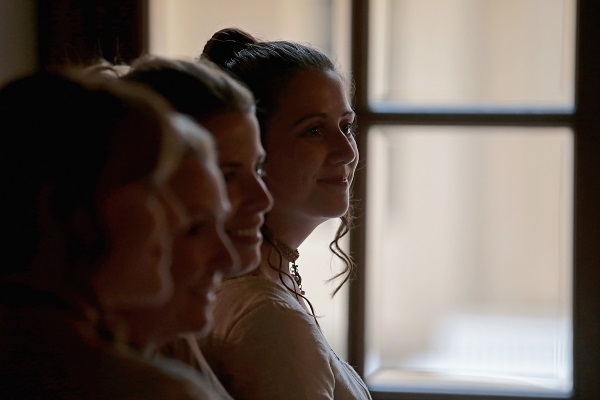from The Rape of the Lock
And now, unveiled, the toilet stands displayed,
Each silver vase in mystic order laid.
First, robed in white, the nymph intent adores
With head uncovered, the cosmetic powers.
A heavenly image in the glass appears,
To that she bends, to that her eyes she rears;
The inferior priestess, at her altar’s side,
Trembling, begins the sacred rites of pride.
Unnumbered treasures ope at once, and here
The various offerings of the world appear;
From each she nicely culls with curious toil,
And decks the goddess with the glittering spoil.
This casket India’s glowing gems unlocks,
And all Arabia breathes from yonder box.
The tortoise here and elephant unite,
Transformed to combs, the speckled, and the white.
First of all let’s be clear that ‘toilet’ in the first line means all the bits of equipment this young lady needs to help her get dressed. I wouldn’t want you to be picturing her next to a sparkling Armitage Shanks. This ‘nymph’ is Belinda, the fashionable heroine of Pope’s mock-epic who has just awoken at the early hour of noon. Her maid is about to prepare her for a busy day of card playing and flirting.
In mock-epic, what’s being mocked? The people in the mock-epic, or epic poetry itself? Both appear ridiculous when poetic conventions are misapplied. A maid helping her mistress to dress is not really an ‘inferior priestess’ decking a ‘goddess’ with treasure. There’s a mismatch between style and subject, but whilst that would normally make writing weak, here it is clearly deliberate.
In cases like this a writer might be trying to point out the inadequacies of old styles. That’s what Cervantes is often said to have done in Don Quixote. There the protagonist is so obsessed with pseudo-medieval romances about knights that he thinks he’s in one. Flaubert’s Madame Bovary makes the same mistake about sensational novels.
But surely Pope, whose most substantial work was a translation of all of Homer, couldn’t have wanted to dismiss the epic tradition like that? It seems more like he’s satirising his own subjects, pointing out how different Belinda and her maid are to the heroic characters of epic poetry (including women like Penelope and Cassandra). Maybe he is trying to show that the modern world is only good for mock-epic. That seems to have been the conclusion of lots of writers since Pope, including James Joyce who wrote Ulysses as a retelling of the Odyssey in the Dublin that he knew. Is the unfitness of the modern world as an epic subject a sign of decline?
Pope is definitely being satirical. Like Joyce, one of Pope’s strengths is his ability to engage meaningfully with the epic tradition even while he uses it for parody. In this extract he does so with what seems like a misogynist intention. Belinda more than half echoes Eve in Paradise Lost – Milton’s very serious epic from the previous century. Just after she has been created, Eve sees a reflection of herself in a pool of water. Bewitched by the image’s beauty, and thinking that she’s looking at another creature, Eve would have stayed staring at it until she ‘pined with vain desire’ if she hadn’t been warned by a mysterious voice that she was looking at herself.
Belinda has no such voice to guide her, but then she knows full well that the ‘heavenly image’ in the mirror to which ‘her eyes she rears’ is her own reflection. Milton leaves us to work out the implications of Eve’s self-absorption but Pope is quicker to condemn, calling Belinda’s toilette ‘the rites of pride’. If the modern world is unheroic and fallen, does Pope think that the pride of women is to blame again?
Also like Eve, Belinda lives in a paradise of abundance. She is surrounded by beautiful silver articles which are ‘in mystic order laid’ (just as Eden was laid out by God). She also enjoys the ‘various offerings of the world’. Being rich in England in the early-eighteenth century meant having access to all ‘the various offerings of the world’ which a growing empire of trade could provide, and Belinda is well provided with perfume from Arabia and jewels from India. Her room is a good imitation of Milton’s Paradise whose air is perfumed like the winds which greet travellers off ‘the spicy shore of Arabie the blest’, and where a great river flows from a ‘sapphire fount’ over ‘orient pearl’ and ‘sands of gold’.
But there is also something un-Edenic about Belinda’s boudoir. Her combs are made from tortoiseshell and the elephant ivory. These animals have been killed and worked into unnatural shapes to minister to her vanities. There is a faint hint of violence and of humankind’s willingness to exploit the natural world. Even if the prosperity of mercantile Britain can replicate the splendours of Eden, it can never recover its innocence. Pope has written a mock-epic for a mock-Paradise. But is it fair of him to make a mock-Eve to live there?






Comments